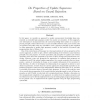2948 search results - page 101 / 590 » More Principled Design of Pervasive Computing Systems |
TPLP
2002
14 years 9 months ago
2002
In this paper, we consider an approach to update nonmonotonic knowledge bases represented as extended logic programs under the answer set semantics. In this approach, new informat...
AINA
2006
IEEE
15 years 1 months ago
2006
IEEE
The paper discusses the potential usage of principles from General System Theory (GST) and Cybernetics for design of Autonomic Software. Motivated by the characteristics of open s...
ACMSE
2007
ACM
15 years 1 months ago
2007
ACM
Modularity, hierarchy, and interaction locality are general approaches to reducing the complexity of any large system. A widely used principle in achieving these goals in designin...
KBSE
2007
IEEE
15 years 4 months ago
2007
IEEE
Growth in the complexity of computing systems, in the dynamism of the environments they operate in, and the need for timely adaptations as conditions change, now pose significant...
95
Voted
IWRT
2008
14 years 11 months ago
2008
RFID (Radio Frequency Identification) systems are emerging as one of the most pervasive computing technologies in history due to their low cost and their broad applicability. Altho...

